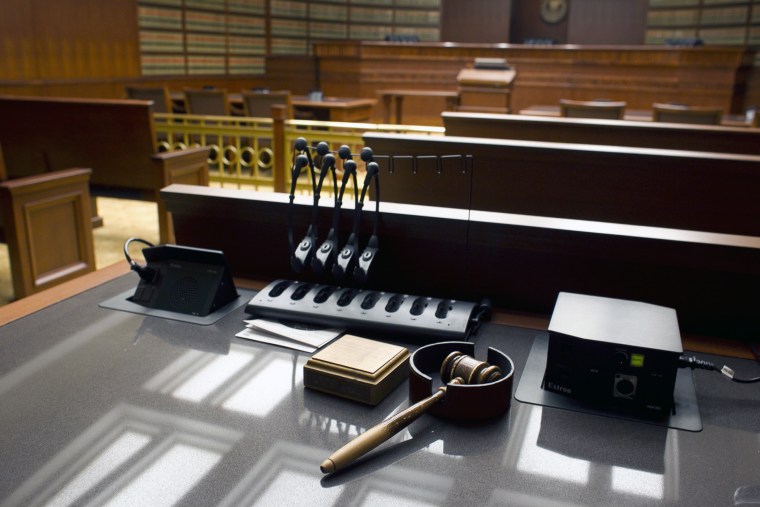Donald Trump published a tweet the other day "congratulating" Republicans. "Today I signed the 160th Federal Judge to the Bench," the president wrote. "Within a short period of time we will be at over 200 Federal Judges, including many in the Appellate Courts & two great new U.S. Supreme Court Justices!"
His terminology was wrong -- one does not "sign" a judge -- and the numbers and punctuation weren't quite right, but Trump's overall point was important. He and his GOP brethren are dramatically altering the federal judiciary; Americans will be dealing with the consequences of this for decades; and there's not much anyone can do to slow the runaway train.
The HuffPost's Jennifer Bendery took stock earlier this week of where things stand.
Two and a half years in, what stands out about Trump's confirmed judges isn't just the quantity, which is remarkable -- two Supreme Court justices, a record-breaking 43 appeals court judges and 99 district court judges.It's that a chunk of his judges shouldn't be on the bench at all because they aren't qualified or they're so ideologically extreme that it's next to impossible to imagine them as fair arbiters of justice. These judges are now on federal courts at every level, from the Supreme Court to appeals courts, which have the final say in nearly all federal cases, down to district courts, where these cases are first filed. For the appeals court judges in particular, the decisions these people make will affect you and millions of other people for generations.
I've long believed the lasting effects of the Trump era can be boiled down to the three C's: the climate, the nation's credibility, and the federal courts. Health care benefits can be restored, alliances can be rebuilt, and tax breaks can be scrapped, but the lost years on dealing with the climate crisis are tragic; it'll be a long while before the world forgets that we're a country capable of electing someone like Trump; and with Republicans confirming young, far-right ideologues to the bench at a brutal clip, we can expect a generation's worth of conservative court rulings.
Some of the jurists are more striking than others. Take Steven Menashi, for example, whose confirmation hearing in the Senate Judiciary Committee began this morning.
Menashi, a nominee for the 2nd Circuit, is an associate counsel to the president with an ugly record. You may have seen Rachel's recent segment on a law journal article Menashi wrote arguing that democratic countries work better when everyone in the same ethnicity.
Jennifer Bendery noted that the list of concerns keeps going from there.
As CNN first reported, Menashi complained about “gynocentrists” participating in Take Back the Night marches; accused the Human Rights Campaign of having “incessantly exploited the slaying of Matthew Shepard” for political benefit; and claimed that a Dartmouth fraternity wasn’t being racist when it held a “ghetto party” attended by white partygoers wearing Afros and carrying toy guns.Menashi’s past writings include him comparing race data collection in college admissions to Germany under Adolf Hitler; denouncing women’s marches as sexual assault; opposing the ”radical abortion rights advocated by campus feminists and codified in Roe v. Wade”; arguing that diverse communities “exhibit less political and civic engagement, less effective government institutions, and fewer public goods”; and writing that it is “ridiculous” to say that students chanting the Dartmouth football cheer, “Wah-hoo-wah! Scalp ’em!,” are propagating “a racist belief in the inferiority of American Indians.”
In a 1998 opinion article, Menashi opposed need-based financial aid because, he argued, it hurt wealthy people. He also spread the Islamophobic myth that Gen. John Pershing executed Muslim prisoners in the Philippines in 1913 with bullets dipped in pig fat.
Demand Justice's Brian Fallon described Menashi as "a perfect storm of awful."
With this in mind, Republicans have orchestrated a scheme to move Menashi through the Senate quickly: the White House formally nominated him on Monday; the GOP-led Judiciary Committee scheduled his confirmation hearing minutes later; and Menashi began fielding senators' questions this morning.
I'm not aware of any judicial nominee's confirmation process ever moving this quickly, and there's no great mystery as to why Republicans are rushing: they hope to get the 40-year-old conservative through the chamber before opponents can mobilize and draw attention to just how far to the right this guy is.
